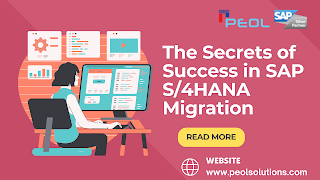How do you choose the best SAP implementation partner to ensure a smooth project?
Introduction:
Choosing the right SAP implementation partner can make or break your digital transformation journey. It's not just about technical skills it's about strategic vision, industry experience, and cultural fit. A reliable SAP partner will help streamline processes, ensure seamless integration, and avoid common pitfalls during deployment. With countless options available, selecting the best partner requires a thoughtful approach. In this blog, we’ll walk you through the key factors that matter most from assessing expertise and support systems to evaluating pricing models so you can make a confident, informed decision.
Understand the Role of an SAP Implementation Partner:
Look for Industry-Specific Experience:
SAP is a versatile platform used across industries from manufacturing and healthcare to retail and finance. However, each sector has its own challenges and regulatory frameworks. A partner who understands your industry will already be familiar with best practices, compliance requirements, and proven implementation frameworks. They can foresee potential hurdles and offer solutions faster. Always ask for case studies or references from clients in your domain to verify their experience.
Evaluate Their SAP Expertise and Certifications:
Not all partners are created equal. The best SAP implementation partners will hold certifications directly from SAP, such as “SAP Gold Partner” or “SAP Certified Services Partner.” These titles demonstrate a proven track record of successful implementations, technical expertise, and client satisfaction. Additionally, check their experience across SAP modules like SAP S/4HANA, SAP Business One, or SAP SuccessFactors, depending on what your business needs.
Check Their Implementation Methodology:
A smooth project requires a clear and structured roadmap. The right partner will follow a well-defined implementation methodology such as SAP Activate that includes stages like planning, designing, building, testing, and deployment. A partner who is transparent about timelines, deliverables, and risk mitigation strategies reduces surprises and keeps the project on track. Be cautious of partners who promise ultra-fast rollouts without explaining their process.
Prioritize Communication and Collaboration:
Open communication is a must. Your SAP implementation partner should be responsive, proactive, and easy to work with. They must be willing to collaborate closely with your in-house team and ensure alignment at every stage. Look for a partner who assigns dedicated project managers and subject matter experts (SMEs) who understand your vision. Effective communication avoids confusion, eliminates redundancy, and accelerates decision-making.
Ask About Post-Implementation Support:
Go-live is not the end it’s just the beginning. Many businesses face glitches, user adoption issues, or integration problems after deployment. That’s why ongoing support is crucial. Ask potential partners about their post-implementation support services, such as user training, regular system audits, and troubleshooting assistance. A partner who is invested in your long-term success will offer flexible support plans, 24/7 availability, and continuous system optimization.
Assess Their Track Record and Reputation:
Do your homework. A reputable SAP partner will have a solid client portfolio, strong testimonials, and high success rates. Check online reviews, industry forums, and even LinkedIn profiles to validate their claims. Don’t hesitate to request client references and ask those clients about their real-world experience with the partner including project delays, communication quality, and overall satisfaction.
Ensure They Align With Your Budget:
Cost should never be the sole deciding factor but it’s still a major consideration. A top-tier SAP implementation partner will offer transparency in pricing, detailed cost breakdowns, and multiple engagement models (like fixed cost, time & material, or hybrid). Be cautious of vendors who offer the lowest price without a clear scope these often come with hidden costs or quality issues. Your chosen partner should deliver value, not just a bargain.
Examine Scalability and Innovation:
Your SAP implementation partner should think beyond today. As your business grows, your SAP system must scale with it. Ask your partner about their experience with cloud migrations, upgrades, system expansions, and process automation. A future-ready partner will also bring innovative solutions like AI, analytics, and IoT integrations into your SAP ecosystem—helping you stay ahead in a competitive market.
Consider Cultural Fit and Values:
Lastly, don't underestimate the importance of a good cultural match. Your partner should understand your company’s values, working style, and decision-making process. A cultural misfit can lead to friction, delays, and misaligned goals. Look for a team that shares your commitment to transparency, accountability, and excellence. When your values align, your implementation becomes not just a project but a partnership.
Conclusion:
Choosing the best SAP implementation partner isn’t a one-size-fits-all process. It demands a careful blend of research, clarity, and instinct. From technical certifications and industry expertise to communication style and post-go-live support, every factor plays a vital role in ensuring a successful rollout. Don’t rush the decision. Instead, take time to interview, compare, and build trust. The right partner will not only deliver a smooth implementation they’ll help future-proof your business for years to come.
For More Details:
Call: +91-8040905243
Mail: sales@peolsolutions.com
Visit: www.peolsolutions.com




Comments
Post a Comment